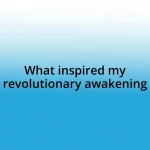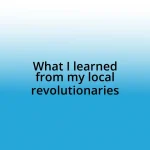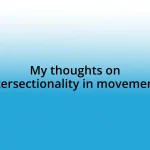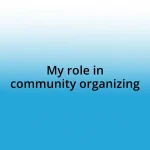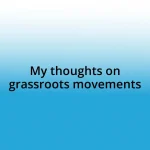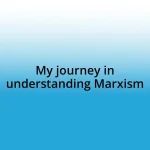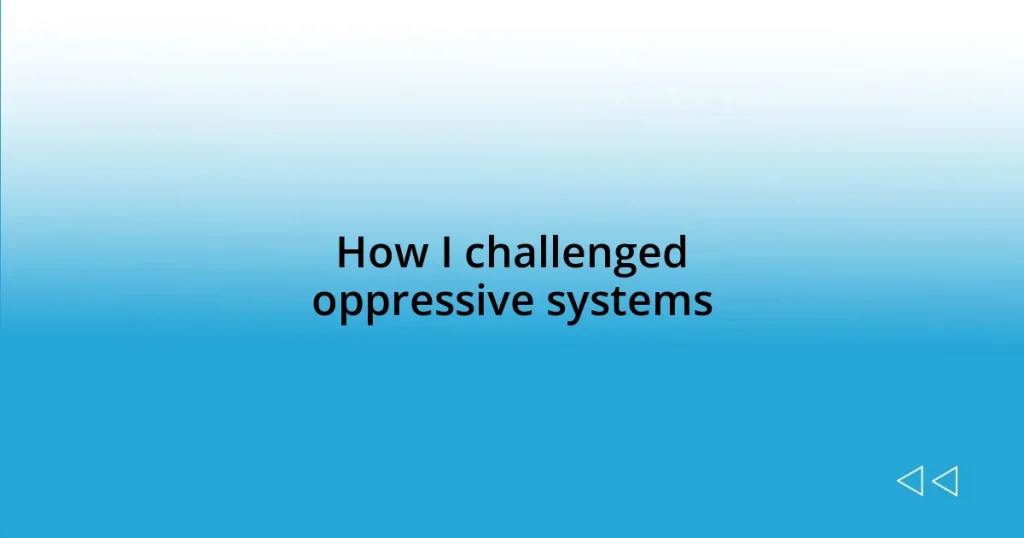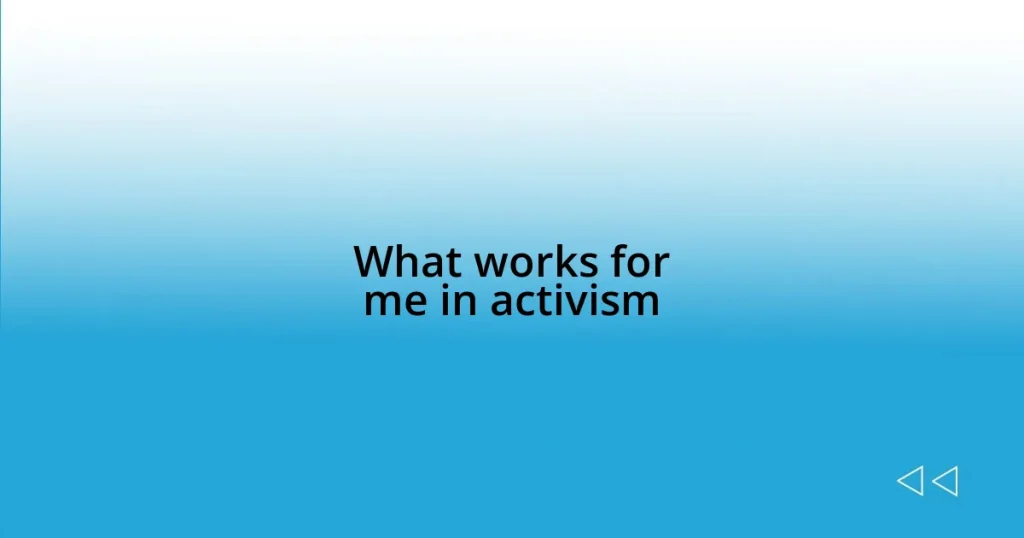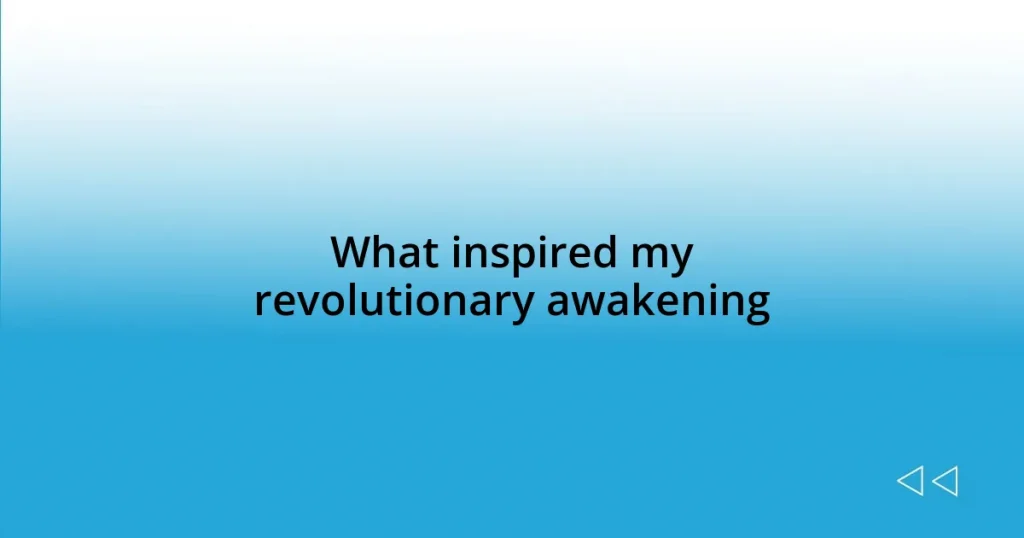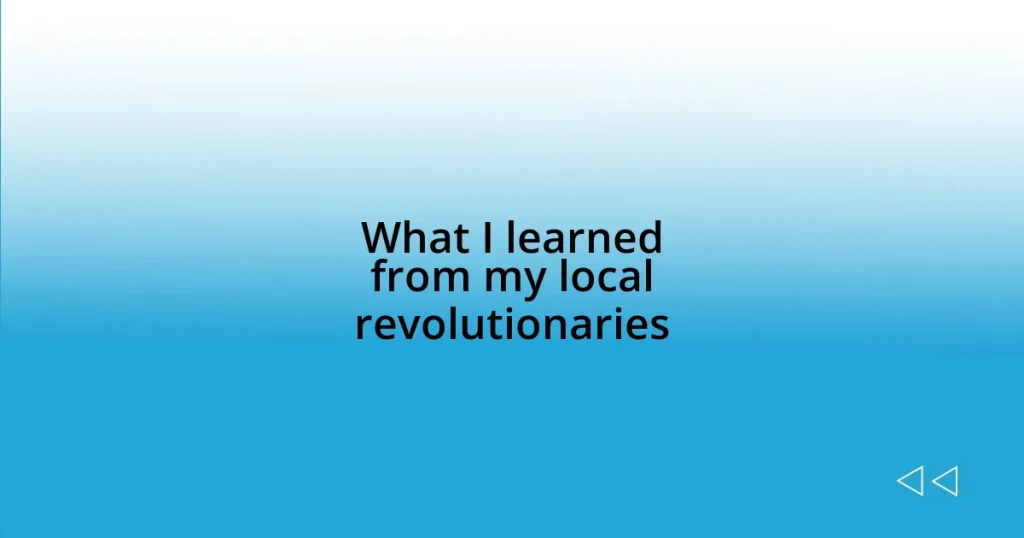Key takeaways:
- Understanding oppressive systems requires breaking down complex factors like race, class, and gender into manageable discussions to foster awareness and action.
- Effective communication and active listening are crucial to engaging others and transforming conversations into collective movements against oppression.
- Building alliances through vulnerability and shared experiences enhances trust and support, making collective efforts more impactful.
- Measuring progress through both qualitative and quantitative methods fosters accountability, helping to sustain long-term change in the fight against oppression.
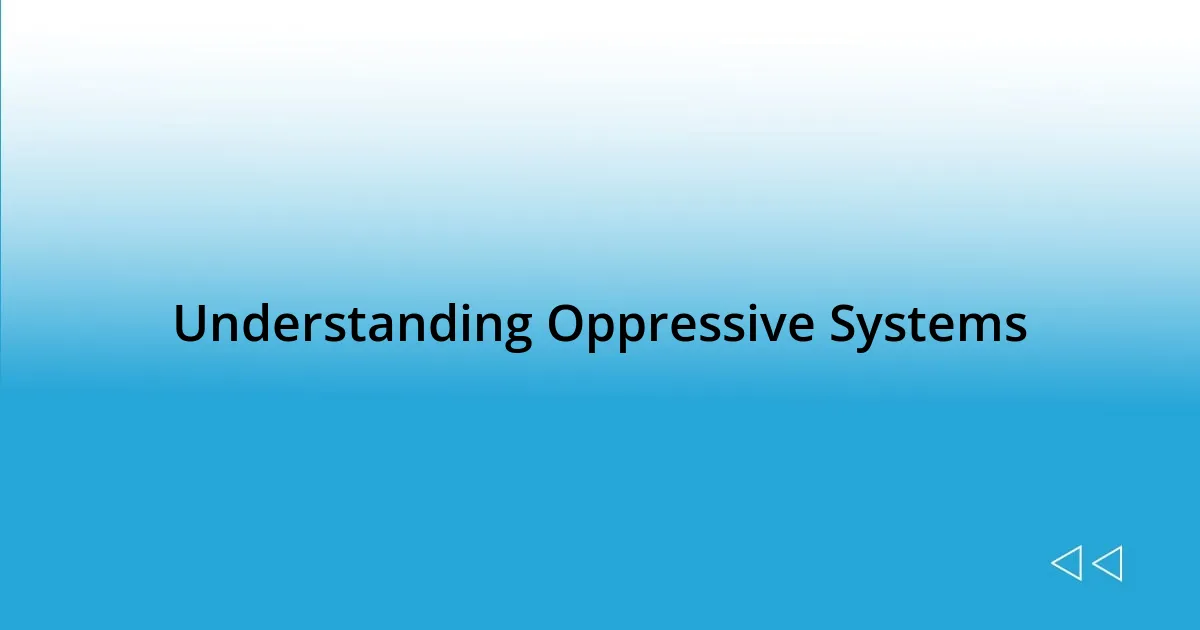
Understanding Oppressive Systems
Oppressive systems are deeply entrenched structures that perpetuate inequality, often masking themselves in the guise of tradition or societal norms. I remember feeling a sense of disbelief the first time I encountered blatant discrimination; it was like being thrust into a harsh reality where certain voices were silenced. Have you ever felt that jarring realization that what you thought was “the way things are” isn’t the only way, or even the right way?
At times, understanding these systems can be overwhelming. The sheer complexity of interlocking factors—like race, class, and gender—can leave you questioning, “Where do I even begin to make a difference?” In my experience, breaking these systems down into smaller, manageable pieces made the challenge less daunting. Each conversation I had, each story I heard, added layers to my understanding, revealing the nuances of real hardships.
Moreover, oppressive systems thrive on invisibility; they become normalized and accepted, often going unchallenged. I vividly recall a discussion with friends where we unpacked our own experiences with microaggressions, realizing just how pervasive these subtle forms of discrimination were. How often do we overlook the little things, thinking they don’t matter? This reflection sparked an urgency in me to not only recognize these instances but to actively question and confront them.
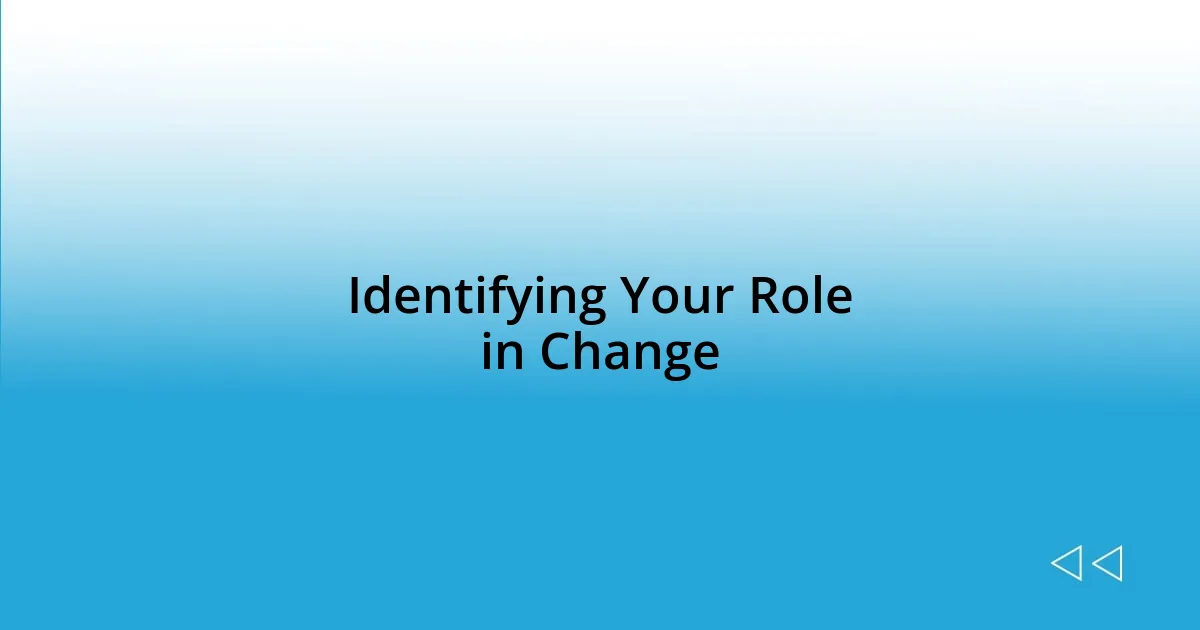
Identifying Your Role in Change
Identifying your role in creating change doesn’t always come easily. I’ll never forget the moment I realized I could use my privilege to help those whose voices were often drowned out. It was during a community meeting when someone spoke up about their struggles; feeling compelled to echo their concerns made me recognize that simply listening wasn’t enough. Have you thought about how your unique skills could contribute to a collective effort for change?
When I look back, I realize that my role shifted based on the situation—sometimes, I was a cheerleader, while other times, I needed to take the lead. For instance, stepping in to organize a workshop on allyship was a turning point for me. It not only amplified marginalized voices but also educated others in the community on how they, too, could take action. Each person’s path is different, but I’ve learned that understanding where you fit in can enhance the impact of your contributions.
Engaging with others is crucial for challenging oppressive systems. Collaborating with friends and activists brought my awareness to how interconnected our struggles were. I cherish the candid conversations we had about our fears and aspirations, which ignited a sense of camaraderie among us. What’s your experience in connecting with like-minded individuals? Finding a supportive network can help clarify your role and elevate collective efforts.
| My Role | Description |
|---|---|
| Listener | Encouraging others to share their experiences and understanding the depth of their struggles. |
| Organizer | Creating spaces for dialogue and action, like workshops or community events. |
| Advocate | Using one’s platform to amplify marginalized voices and support causes directly. |
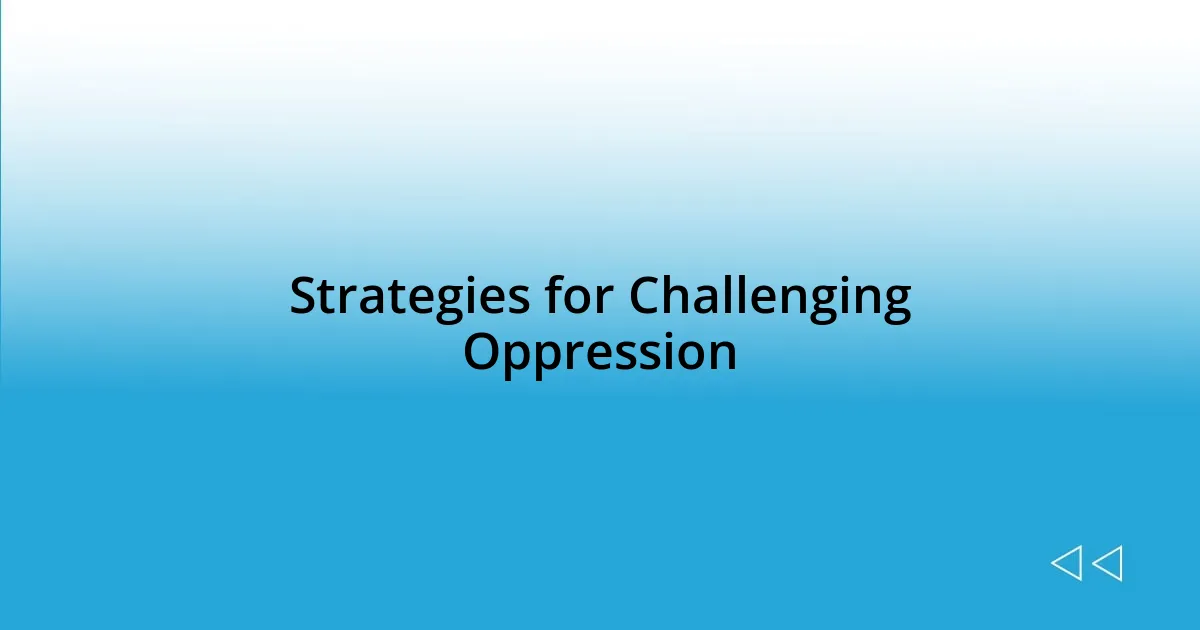
Strategies for Challenging Oppression
Challenging oppression requires a multi-faceted approach that often involves both personal reflection and collective action. I recall a time when I stood alongside a friend at a protest, feeling the energy of the crowd wash over me. It hit me then—this was not just about raising our voices but about standing firm together. Nothing compares to the empowerment you gain from collective determination.
Here are some effective strategies to think about:
- Educate Yourself and Others: Knowledge is power. Take the time to understand different types of oppression and share your insights; it can spark crucial conversations.
- Engage in Active Listening: When people share their stories, listen with empathy. You’d be surprised at how much you can learn by simply being present.
- Build Alliances: Connecting with diverse groups can amplify your actions. I remember organizing a coffee chat with activists from various backgrounds, which opened my eyes to different perspectives.
- Participate in Community Activities: Find local initiatives where you can contribute. Being hands-on fosters a deeper connection to the cause.
- Challenge Microaggressions: Speak up when you witness subtle forms of discrimination. I once called out a friend’s comment that seemed innocuous at first but reflected deep-rooted biases; the awkwardness led to a meaningful conversation.
Taking these steps requires courage and vulnerability. I’ve learned that it’s okay to stumble along the way—as long as you’re committed to learning and growing. After all, every little action counts.
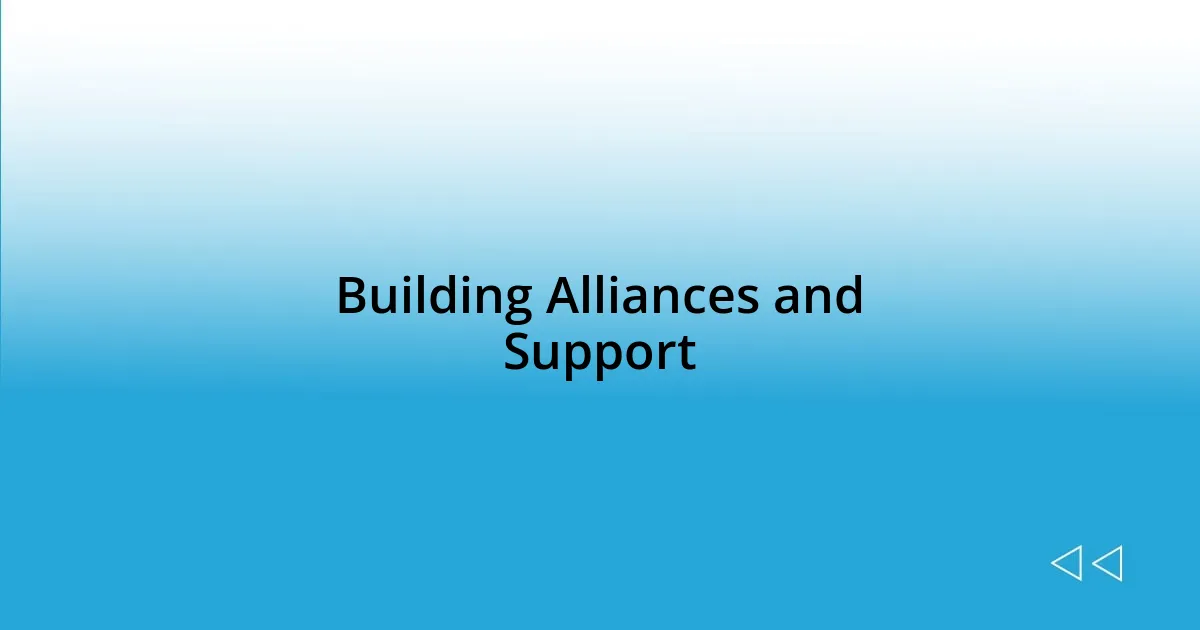
Building Alliances and Support
Building alliances is essential in the fight against oppressive systems. I vividly recall collaborating with a diverse group of activists for a community event. Each of us brought different strengths to the table, and the synergy created was electric. Have you ever experienced that exhilarating moment when everyone’s unique perspectives come together to create something greater? When we shared our stories and strategies, I realized that none of us could tackle these challenges alone.
Creating a support network also means being vulnerable and open to learning from one another. I remember a late-night brainstorming session with friends where we discussed our frustrations and dreams. It was uncomfortable at times to confront our biases, but that vulnerability fostered deep trust among us. It’s hard to support one another without honesty, don’t you think? This experience showed me that authentic relationships are the foundation for meaningful change.
As we built these connections, I began to see the world through different lenses, which enriched my understanding of systemic issues. I often wonder how many others miss out on this transformative experience simply because they hesitate to reach out. My journey taught me that building alliances isn’t just about extending hands; it’s about actively engaging with and uplifting one another. When we stand together, our collective voice becomes a powerful tool against oppression.
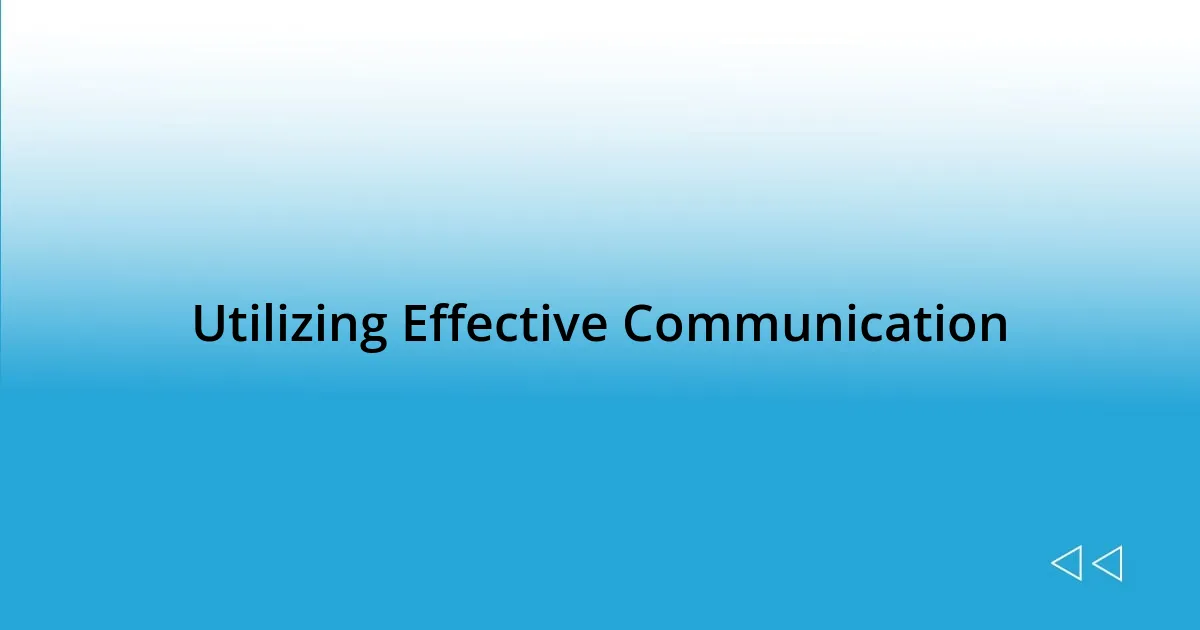
Utilizing Effective Communication
Effective communication plays a crucial role in challenging oppressive systems. I remember a moment during a discussion with some classmates where I hesitated to voice my opinion because I feared backlash. But then I realized how much my perspective mattered; it could help others see the issue differently. Have you ever held back your thoughts, only to find that speaking up can ignite a spark in someone else? That evening, sharing my thoughts transformed our conversation into a vibrant exchange of ideas, reinforcing the power of open dialogue.
Moreover, I’ve learned that clear and respectful communication can diffuse tense situations. I once attended a community meeting where emotions ran high over a controversial policy. Instead of letting frustration take over, I tried to articulate my feelings calmly, inviting others to do the same. And you know what? It worked. By prioritizing a respectful tone and encouraging others to share their stories, we shifted the discussion from divisiveness to understanding. Isn’t it fascinating how communication can turn conflict into collaboration?
It’s also vital to adapt our communication styles to different audiences. I recall facilitating a workshop for young adults where we used role-playing to explore real-life scenarios of discrimination. Engaging them through relatable examples not only captured their attention but sparked meaningful conversations. I often think about how powerful it is when we tailor our message to resonate with those we’re trying to reach. With every experience, I’ve come to appreciate how effective communication can be a catalyst for change, connecting hearts and inspiring action in the fight against oppression.
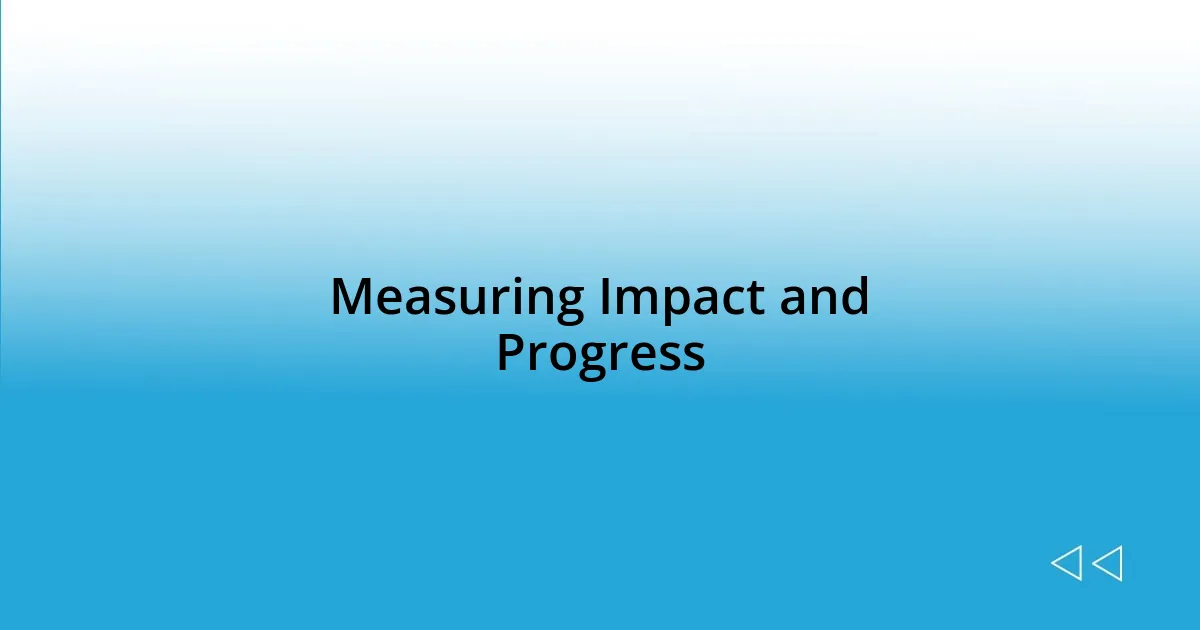
Measuring Impact and Progress
Measuring the impact of our efforts against oppressive systems can often feel elusive, but it’s an essential step in understanding our progress. For instance, I remember conducting a survey after a community workshop aimed at raising awareness about discrimination. When the responses came back revealing shifts in participants’ attitudes, I felt a rush of hope mixed with relief. Did what we do really make a difference? Seeing those numbers brought a tangible sense of accomplishment, highlighting that sometimes the smallest shifts can lead to monumental changes in perception.
Tracking our progress also requires a mix of qualitative and quantitative approaches. I once participated in a project where we documented personal stories alongside statistical data, creating a fuller picture of the impact we were having. It’s fascinating how narratives can breathe life into cold hard facts. I often ask myself how many more hearts could we touch by connecting statistics with personal experiences? When we sharing our stories alongside metrics, we create a more compelling argument for change, motivating others to join the cause.
As I reflect on these experiences, I realize that measuring our impact is not merely about numbers—it’s about fostering a culture of accountability and reflection. I had a mentor who encouraged regular check-ins with the team, facilitating discussions about what was working and what wasn’t. This practice wasn’t always comfortable, but it illuminated paths for improvement we had missed. How often do we pause to really assess our progress? Establishing such routines helps ensure that we’re not just moving forward blindly, but with a clear vision and purpose, paving the way for sustainable change.
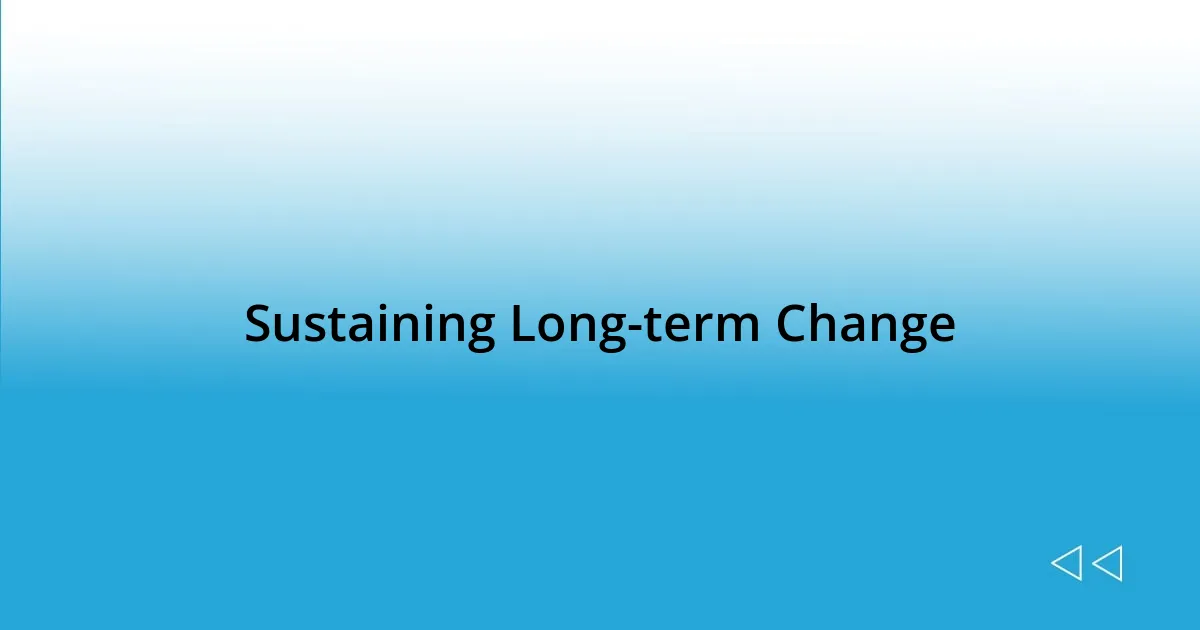
Sustaining Long-term Change
Creating and sustaining long-term change is a journey that requires constant nurturing. I remember a grassroots project I was part of, where we spent months building relationships in the community. It struck me how vital those connections were; trust turned out to be a key ingredient for longevity. Have you ever found that it’s the friendships and networks built over time that make collective efforts resilient? Without those bonds, I doubt our initiative would have thrived as it did.
Consistency is another cornerstone of sustaining change. After we launched our initiative, regular follow-ups were crucial. I recall scheduling monthly check-ins with both participants and leaders, exploring what challenges emerged and celebrating small wins. This helped maintain momentum and fostered a sense of shared responsibility. It’s fascinating how when people feel invested and see their input valued, they take ownership of the cause. Have you considered how accountability can empower each member of a movement?
Lastly, adapting to ever-changing circumstances is essential in this work. During an unexpected downturn, I observed how our efforts could easily falter if we didn’t pivot quickly. Instead of seeing obstacles as setbacks, we regrouped to brainstorm new approaches. The moment we came together and embraced change, I felt a renewed energy in our group. Isn’t it incredible how resilience can transform challenges into opportunities? By remaining flexible and open to evolution, we can truly create a lasting impact, poised for whatever comes next.


